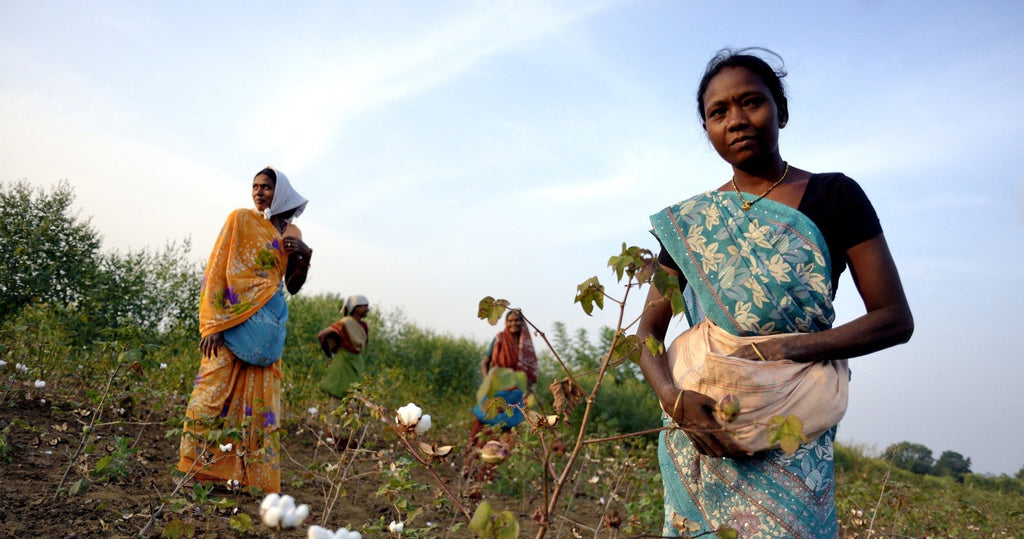The Natural Choice: Why Organic Cotton is the Best Fabric Option

In a world of fast fashion and ever-changing trends, it’s time to slow down and rethink our approach to clothing. Imagine a closet filled with pieces that not only make you look good, but also make you feel good about your choices. Enter organic cotton clothing – the fashion-forward, eco-conscious option that more and more consumers are gravitating toward.
If you’re wondering whether it’s worth the cost and effort to purchase organic cotton garments instead of clothes made from conventional cotton, we’re here to help. All you have to do is answer two easy questions:
- Do you care about the health and wellbeing of the people who make your clothes?
- Does it matter to you if waterways, ecosystems, and animal habitats are polluted with deadly toxins?
If you answered yes to one or both of these questions, organic cotton is the fiber for you! Organic cotton is simply cotton that is farmed without chemicals, fertilizer, or pesticides. That’s it! Farmers use rotation techniques, helpful insects, and human labor to grow their crops instead of harmful chemicals – working with nature instead of against it.
Conventional cotton is known as “the world’s dirtiest crop” because it uses more pesticides than anything else grown around the world. GMO cotton varieties are also commonly used in conventional cotton farming. These chemicals are used to control pests and boost crop yields but can have adverse environmental and health impacts.
Every year, about 200,000 people die from pesticide poisoning, and far more farmers suffer from chronic illnesses like cancer, Alzheimer’s, Parkinson’s disease, hormone disruption and developmental disorders. Most of these farmers live in poverty and have no choice but to accept low paying jobs like applying toxic chemicals to cotton crops. More often than not, the farmers are illiterate or unable to read toxicity warnings on the packaging because they’re printed in a foreign language. They’re coerced into using dangerous products without the means to make an informed decision.

Organic cotton farming prioritizes the farmers’ health by eliminating exposure to harmful chemicals and fostering social, economic, and environmental benefits that contribute to the well-being of their communities. Because organic cotton farming requires more labor-intensive practices than conventional farming, there’s an increased demand for workers. This creates job opportunities within the community, providing employment for local residents – jobs that are especially valuable in rural areas where opportunities are scarce.
Farming organic cotton involves knowledge sharing within the community. Experienced organic farmers may offer training and mentorship to new farmers, helping to build local expertise and skills. Often, these farming practices align with traditional and culturally significant agricultural methods. This can help preserve the cultural heritage of rural communities and promotes a sense of pride and identity among community members.
Another negative effect of using toxic chemicals to farm cotton is excessive water usage and pollution. Conventional cotton typically uses irrigation from surface or ground water, while organic cotton is rainfed. Organic cotton farming practices promote healthier soil that retains moisture more effectively, reducing the need for excessive irrigation. Irrigation places stress on the local ecosystem, diverting water away from natural rivers and lakes to be used on the cotton crops instead. Water scarcity is becoming an increasingly dangerous issue as climate temperatures continue to rise, and conventional cotton farming is exacerbating the problem.
Community water sources are also threatened by the chemicals washed away from conventional cotton. Drinking water and food production are directly impacted by the toxic chemicals that cannot be broken down or metabolized and therefore remain in water and soil for many years. Growing organic cotton instead of conventional cotton reduces levels of water pollution by 91%, according to Water Footprint. Organic cotton supports soil biodiversity and helps mitigate the effects of climate change by preventing harmful chemicals from polluting water sources and other habitats.
Organic farming practices like crop rotation and the use of cover crops help sequester carbon in the soil. This can also contribute to mitigating climate change by reducing the carbon footprint associated with cotton production.
Organic cotton garments are safer for you, the consumer, because they’re processed without toxic chemicals like formaldehyde, ammonia, and softening agents that would transfer to you in trace amounts with each wear. With organic cotton, you won’t have toxins embedded in the fibers of your clothes – it’s a no brainer for shoppers with allergies or sensitive skin.
Additionally, organic cotton is often associated with higher quality clothing. Without harsh chemicals being used to grow the cotton, the fabric is softer, more durable, and holds its shape and color over time. When you buy Passion Lilie organic cotton clothing, you can be sure your clothes will stand the test of time. When organic cotton clothing eventually does reach the end of its lifecycle, it’s less likely to contribute to landfill waste because it’s more biodegradable than conventionally grown cotton.
You can make a true difference for farmers, their families, and our global environment through your purchasing power. When you’re shopping, be on the lookout for the logos of accrediting bodies like the Global Organic Textile Standard (GOTS), Organic Content Standards (OCS) or Soil Association. These organizations ensure your products have met the highest standards of organic production throughout the supply chain from farm to finish.
When you support brands that invest in organic cotton, you’re telling the farmers that their lives and their families matter. Choosing organic cotton supports farmers who are committed to sustainable and ethical farming practices. It encourages the adoption of eco-friendly methods that protect the planet and promote long-term sustainability. Your purchase of organic cotton clothing demonstrates that brands can succeed by investing in small, sustainable, chemical free farms, and that we’re willing to pay a little extra for the protection they offer people, animals, and the planet.
Choosing organic cotton is a conscious and responsible decision that benefits both the environment and human health. By opting for organic cotton clothing, you are supporting sustainable farming practices, reducing the use of harmful chemicals, and promoting a healthier planet. You’re not just buying clothing; you’re investing in a better future for farming communities around the world. So, the next time you shop for clothing, consider the natural choice: organic cotton. Your wardrobe will thank you, and so will the planet.
Sources:
https://catalogue.unccd.int/1352_thirsty-for-fashion-soil-association-report.pdf
https://www.pan-uk.org/cotton/
https://www.wri.org/insights/apparel-industrys-environmental-impact-6-graphics



Leave a comment